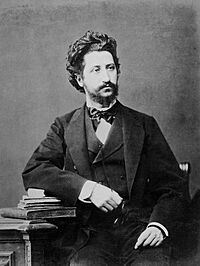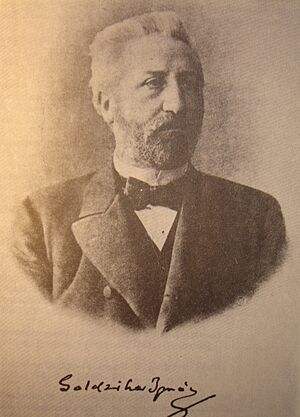Ignác Goldziher facts for kids
Quick facts for kids
Ignác Goldziher
|
|
|---|---|

Portrait
|
|
| Born | 22 June 1850 Székesfehérvár, Hungary
|
| Died | 13 November 1921 (aged 71) Budapest, Hungary
|
| Nationality | Hungarian |
| Scientific career | |
| Fields | Islamic studies |
Ignác Goldziher (born June 22, 1850 – died November 13, 1921) was a famous Hungarian scholar. He spent his life studying Islam. He is often called Ignaz Goldziher.
Many people see him as one of the founders of modern Islamic studies in Europe. He shares this credit with Theodor Nöldeke from Germany and Christiaan Snouck Hurgronje from the Netherlands. Goldziher also wrote an important book called Mythology among the Hebrews. In this book, he explored ancient Jewish stories. He explained how similarities in myths across cultures could come from shared ideas about stars.
Contents
Early Life and Education
Ignác Goldziher was born in Székesfehérvár, Hungary. He came from a German Jewish family. He was a very smart student. He studied at several universities, including those in Budapest, Berlin, Leipzig, and Leiden. A Hungarian minister named József Eötvös helped support his studies.
In 1872, he became a private teacher at the University of Budapest. The next year, the Hungarian government helped him travel. He visited Syria, Palestine, and Egypt. While in Cairo, he attended lectures by Muslim teachers at the famous al-Azhar mosque. This trip helped him learn a lot about Islam.
His Deep Connection to Islam
Goldziher kept a personal journal where he wrote his thoughts and travel notes. This journal was later published in German as Tagebuch. In his journal, he wrote about how deeply he felt about Islam.
He once wrote that he felt so much like a Muslim during his travels. He believed Islam was the only religion that could truly satisfy thinkers. He also felt that Islam was unique because it rejected superstitions. This was done through its main teachings, not just through logic.
In Cairo, Goldziher even prayed with Muslims. He wrote that he had never felt more truly devoted than on that special Friday.
Staying True to His Faith
Even with his deep interest in Islam, Goldziher remained a devoted Jew throughout his life. This was unusual for someone seeking an academic job in Europe back then. Many scholars would change their religion to Christianity to get better university positions. Goldziher refused to do this.
He turned down several job offers outside of Hungary. He worked hard to understand his own Jewish faith. He saw Islam through the eyes of someone who did not want to fully fit into European culture. He also did not have much liking for European Christianity.
His Work and Career
In 1890, Goldziher published an important book called Muhammedanische Studien. In this book, he suggested that many Hadith (sayings and actions of the Prophet Muhammad) were written later. He believed they reflected arguments within Islam in the centuries after Muhammad's death.
Goldziher did not get a full teaching job at Budapest University until he was 44 years old. Despite this, he represented Hungary at many international meetings. He received a big gold medal at the Stockholm Oriental Congress in 1889. He also became a member of several important academic groups. He was made a Doctor of Literature by Cambridge University in 1904. He also received an honorary law degree from the University of Aberdeen in 1906.
Views on Zionism
Goldziher saw Zionism as a movement about national identity, not just religion. He believed that being Jewish was about religion, not about where you came from. He once said: "Jewishness is a religious term and not an ethnographical one. As regards to my nationality I am a Transdanubian, and by religion a Jew. When I headed for Hungary from Jerusalem I felt I was coming home."
Important Books and Writings
You can find many of his works online. Here are some of his key books:
- Tagebuch (His personal journal)
- Zur Literaturgeschichte der Shi'a (About the history of Shi'a literature)
- Der Mythos bei den Hebräern und seine geschichtliche Entwickelung (Mythology among the Hebrews)
- Muhammedanische Studien (Muslim Studies)
- Vorlesungen über den Islam (Lectures on Islam)
His Lasting Impact
Goldziher's work greatly influenced how people study Islam today. He carefully looked into early Islamic law, traditions, religion, and poetry. He wrote many articles and essays on these topics. One of his ideas, which is still discussed, is that Mecca being the birthplace of Islam might be a myth.
He is seen as one of the key figures who started the critical study of Hadith. He argued that many Hadith were created later in Islamic history. He believed they were used to support different ideas or groups. This meant that the detailed chains of narrators (called isnads) for these Hadith were not always real.
Edward Said, a famous writer, later discussed Goldziher's work. Said noted that Goldziher was one of the few scholars who appreciated Islam's tolerance. Goldziher believed that Islam developed over time, taking in and sharing ideas with other cultures.
See also
- Islamic scholars
- Josef Horovitz
- Joseph Schacht
Images for kids
 | DeHart Hubbard |
 | Wilma Rudolph |
 | Jesse Owens |
 | Jackie Joyner-Kersee |
 | Major Taylor |



